I think I’m one of the few people who doesn’t care much for Out of the Past. It may be that for me the closer a movie gets to film noir, the less it appeals to me. I can’t argue with any of the superlatives used to describe this one. But despite all it does right in terms of noir, I can’t get terribly enthused.
The curious hybrid called Deep Impact
When is a disaster movie not a disaster movie (even though it’s a disaster movie)? The answer is when it’s a Mimi Leder directed disaster movie and the usual trappings of the genre are downplayed and others, usually dealt with in an offhand manner, are lingered over.
A curious Long Goodbye from Robert Altman

To be honest, I’ve never been a big Robert Altman fan, though increasingly I’m finding his movies more appealing. I think his approach creates the sense in me that I’m listening to a slow-talker and I want to interrupt and say, “Move it along; get to the point.” There’s an improvisational feel to character interaction and part of me want’s it more closely scripted and edited.
In The Long Goodbye this comes across partly because Altman gives his actors more responsibility to actually act, as he does with Elliott Gould here, and partly because the camera is constantly moving, as if you as a viewer are watching and trying to find a better vantage point. Some shots are through windows; some are even reflections in windows.
It’s intriguing, yet for me a bit irksome — but that’s just a personal, subjective thing. And what is odd about it is that I like this movie nonetheless.
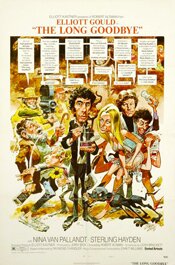 The Long Goodbye (1973)
The Long Goodbye (1973)
Directed by Robert Altman
Robert Altman’s The Long Goodbye is a bit like a fast food hamburger. It has beef in it but also has so many other things, and it has been altered to such a degree, that while it resembles a hamburger, it ain’t no hamburger.
In the same way, Altman’s movie is Raymond Chandler’s book, and resembles a film version of that book, but it ain’t Chandler’s book.
But then, you wouldn’t expect Altman to make a movie utterly faithful to its source.
Altman’s movie begins with the question, “What would happen if Marlowe, a character of the 40s and 50s, were to wake up and find himself in the early 70s?” In an interview, he says they referred to it as “Rip Van Marlowe” during the making of the movie. This idea dictates how the movie plays out.
Chandler’s Marlowe began in 1939 with The Big Sleep. His book The Long Goodbye was published in 1953. That is exactly twenty years before Altman’s The Long Goodbye.
Chandler’s Marlowe had been in about six books prior to the 1953 book. In The Long Goodbye, his Marlowe is older and mellower. The novel is a bit more reflective and, in my opinion, weighty. There is less emphasis on the tough guy posturing of the early books; he comes across as a more mature character. In some ways, there is a sense of alternating melancholy and apathy in him.
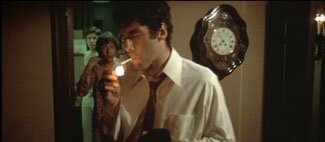
This may be what suggests the “Rip Van Marlowe” possibility to screenwriter Leigh Brackett and director Altman, or at least what makes this book a possible vehicle for working out that theme. However, there is more to the theme than just the “what if” aspect of a man from 1953 waking up in 1973. One thing that has changed for Marlowe is how people view friendship. The world has a different sense of ethics and morality and it isn’t in sync with his.
The movie opens with Philip Marlowe (Elliott Gould) literally waking up. The first half of the movie, particularly the first twenty minutes or so, give us such a slovenly, disconnected and half-asleep Marlowe that, the portrayal being so effective, he is incredibly annoying. He speaks under his breath, muttering to himself more than anyone else, even when responding to others around him. He’s almost completely unengaged with his world.
He shows no animation at all until his friend, Terry Lennox (Jim Bouton) shows up at his door. This is where the story’s engine turns over and it gets underway as Terry asks Marlowe to take him to Mexico.
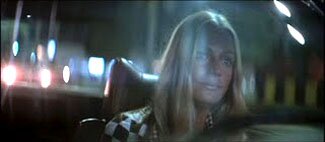
The story makes some major turns from the Chandler book, some for the purposes of condensation and some … Perhaps because they didn’t want to make a movie faithful to its source but one that stood on its own legs as unique.
Having re-read the book recently (which is probably why I keep referring back to it), and it being my favourite of the Chandler novels, I can’t say I like the deviations. I found the book had more meaning for me than the movie largely because of those things that have been changed, though I do like the movie on its own merits.
But the book’s ending is much more effective and moving, I think. The movie is very direct – you can’t miss its point. In a way, it’s like Altman believes he has to be direct because people in 1973 are as much asleep as Marlowe was. His conclusion is like a bucket of cold water in the face.
The “asleep” idea recurs through the movie. It’s not just Marlowe who is somnambulant. His neighbours, the young women with their yoga and exercise, appear to be lost in their own world of new age exercise and spirituality. Roger Wade (Sterling Haydon) is lost in his alcohol and self-pity. Everyone is self-absorbed and inward looking and Marlowe is the one person who “wakened” to this contagion of social sleepwalking.
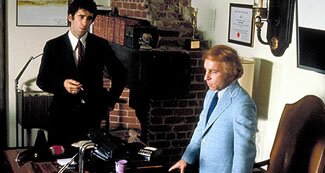
Marlowe “wakes up” because something has wakened him: the death of his friend Terry Lennox. He remains true to his friend, though for all intents and purposes it’s meaningless, isn’t it? (Terry is dead, after all.) Yet Marlowe won’t believe the murder and suicide that are being attributed to his friend.
No one else in the movie is true to anyone or anything. Even Marlowe’s cat abandons him when its favourite food is no longer there. Marty Augustine (Mark Rydell) speaks of how much he loves his girlfriend then strike her horribly for no reason. Roger Wade hits his wife when he is drunk.
Throughout the movie, as Marlowe makes his way, he sees a world of self-interest and no loyalty, making him an anachronism. When asked why he would try to clear the name of Terry Lennox, he hears variations of, “What’s it matter? He’s dead.”
The ending aside, this is probably the greatest deviation from the novel. In the book, respect and loyalty keep appearing – Marlowe is hired for his; the gangsters in the book (unlike the Marty Augustine character) respect Marlowe for his loyalty. Even some of the cops do. He is sought out and hired because it’s reported in the newspapers that he was picked up by the police for questioning and wouldn’t talk.
So the difference in the endings becomes a bit curious. Is it simply a more overt, can’t-miss-that meaning concerning betrayal of a friendship or is it also suggesting that Marlowe, too, is becoming part of that amoral culture of self-centeredness?
I’m not really sure. But I do know this is a curious movie Robert Altman has given us.
A good time had by all
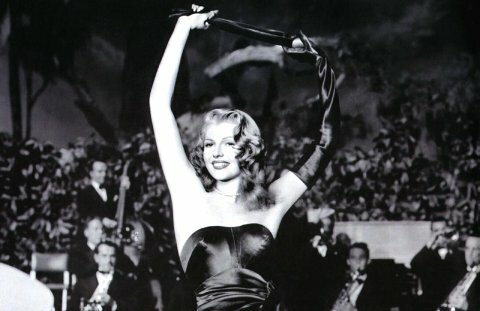
The 2011 version of the For the Love of Film blogathon has wrapped, this year with a focus on film noir. This post is slightly belated given that the last day was Monday.
This year, as last, it was carried out thanks to the efforts of Ferdy on Films and the Self-Styled Siren. Have a look at their blogs for their blogathon wrap-ups, oodles of links to wonderful posts on the subject of film noir from the Interent, and a thank you message from Eddie Muller, president of the Film Noir Foundation. It reads in part:
“Passion is sacred. Thanks to everyone for sharing their passion this past week. Let’s keep carrying the torch, not only for our favorite art form, but for all the things we cherish and refuse to relinquish.”
As for myself, in some ways I’ll be glad to move on to something other than noir while on the other hand I’m going to miss the enthusiasm the past week has been filled with. And maybe I won’t move on to another genre just yet because I’ve enjoyed this so much. I managed to scribble about seven film noirs movie during the blogathon:
- The Hot Spot (1990)
- Gilda (1946)
- Dark Passage (1947)
- Chinatown (1974)
- Anatomy of a Murder (1959)
- I Wake Up Screaming (1941)
- This Gun For Hire (1942)
Of those, in the interests of variety I posted about one I didn’t think was a particularly good movie (Dark Passage) and one that probably isn’t the first movie to pop into your head when the term noir is used (The Hot Spot).
But of them all the one I found myself thoroughly caught up with as far as thinking about it, Gilda is the easy winner. For two days after having watched it yet again (I’ve seen it many times over the years), I kept musing about it. Despite having seen it many times, it was the first time I had thought of it as a portrait of an abusive relationship, which is really what the movie is.
Anyway … though the blogathon is over, I’m pretty sure you can still . So please do so. You can use the link in the right hand column.
Now it’s time to backtrack and catch up on all the posts others have written on the subject of film noir that I have yet to get to!


